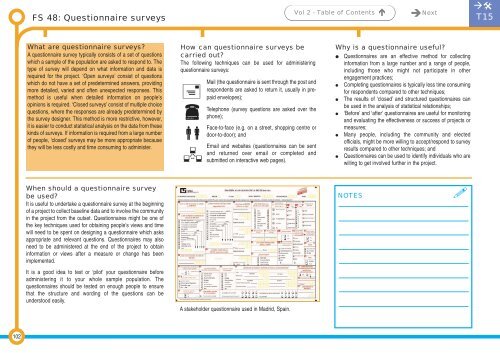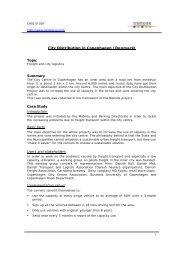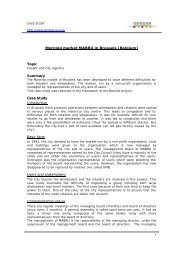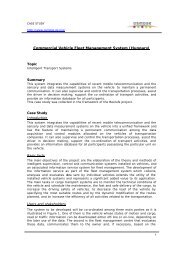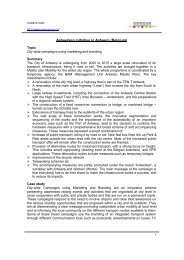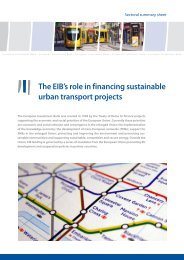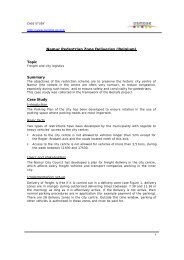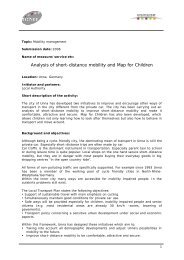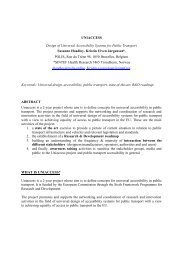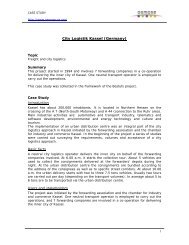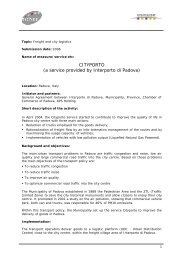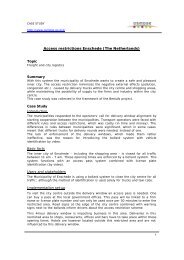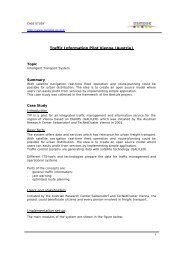Successful transport decision-making - Osmose
Successful transport decision-making - Osmose
Successful transport decision-making - Osmose
You also want an ePaper? Increase the reach of your titles
YUMPU automatically turns print PDFs into web optimized ePapers that Google loves.
FS 48: Questionnaire surveys<br />
Vol 2 - Table of Contents <br />
Next<br />
<br />
T15<br />
What are questionnaire surveys?<br />
A questionnaire survey typically consists of a set of questions<br />
which a sample of the population are asked to respond to. The<br />
type of survey will depend on what information and data is<br />
required for the project. ‘Open surveys’ consist of questions<br />
which do not have a set of predetermined answers, providing<br />
more detailed, varied and often unexpected responses. This<br />
method is useful when detailed information on people’s<br />
opinions is required. ‘Closed surveys’ consist of multiple choice<br />
questions, where the responses are already predetermined by<br />
the survey designer. This method is more restrictive, however,<br />
it is easier to conduct statistical analysis on the data from these<br />
kinds of surveys. If information is required from a large number<br />
of people, ‘closed’ surveys may be more appropriate because<br />
they will be less costly and time consuming to administer.<br />
How can questionnaire surveys be<br />
carried out?<br />
The following techniques can be used for administering<br />
questionnaire surveys:<br />
<br />
<br />
<br />
<br />
Mail (the questionnaire is sent through the post and<br />
respondents are asked to return it, usually in prepaid<br />
envelopes);<br />
Telephone (survey questions are asked over the<br />
phone);<br />
Face-to-face (e.g. on a street, shopping centre or<br />
door-to-door); and<br />
Email and websites (questionnaires can be sent<br />
and returned over email or completed and<br />
submitted on interactive web pages).<br />
Why is a questionnaire useful?<br />
Questionnaires are an effective method for collecting<br />
information from a large number and a range of people,<br />
including those who might not participate in other<br />
engagement practices;<br />
Completing questionnaires is typically less time consuming<br />
for respondents compared to other techniques;<br />
The results of ‘closed’ and structured questionnaires can<br />
be used in the analysis of statistical relationships;<br />
‘Before’ and ‘after’ questionnaires are useful for monitoring<br />
and evaluating the effectiveness or success of projects or<br />
measures;<br />
Many people, including the community and elected<br />
officials, might be more willing to accept/respond to survey<br />
results compared to other techniques; and<br />
Questionnaires can be used to identify individuals who are<br />
willing to get involved further in the project.<br />
When should a questionnaire survey<br />
be used?<br />
It is useful to undertake a questionnaire survey at the beginning<br />
of a project to collect baseline data and to involve the community<br />
in the project from the outset. Questionnaires might be one of<br />
the key techniques used for obtaining people’s views and time<br />
will need to be spent on designing a questionnaire which asks<br />
appropriate and relevant questions. Questionnaires may also<br />
need to be administered at the end of the project to obtain<br />
information or views after a measure or change has been<br />
implemented.<br />
NOTES<br />
<br />
It is a good idea to test or ‘pilot’ your questionnaire before<br />
administering it to your whole sample population. The<br />
questionnaires should be tested on enough people to ensure<br />
that the structure and wording of the questions can be<br />
understood easily.<br />
A stakeholder questionnaire used in Madrid, Spain.<br />
102


